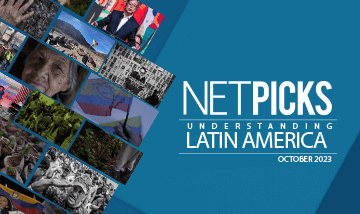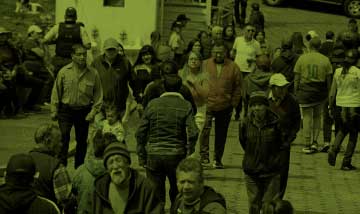Índice
Understanding Latin America
Dear readers and colleagues, this month we bring you five articles that reflect the reality of Latin America: one each from, Colombia, Honduras, Costa Rica, Bolivia and Brazil.
- Colombia ex-fighters brew up new lives after giving up guns
- JOH’s luck runs out
- Costa Rica’s new president threatens women’s and LGBTIQ rights
- In Bolivia, ex-president Áñez’s trial sparks debate about justice
- Despite everything, Bolsonaro could still win
.
COLOMBIA EX-FIGHTERS BREW UP NEW LIVES AFTER GIVING UP GUNS
‘Fruits of Hope’ coffee is grown, harvested, and roasted by more than 1,000 guerrilla fighters who laid down their arms following the 2016 peace agreement between the Revolutionary Armed Forces of Colombia (FARC) and the government. But this is not the only project organized by ex-guerilla fighters looking to reincorporate themselves into civilian life. Others include brewing beer (“La Trocha”, which is Spanish for the paths used by the rebels to move through the forest), and operating rafting expeditions on a river in territory once controlled by the FARC. Almost 13,000 former guerrillas have joined the government reincorporation process, but it has not been easy, says one. “There were failures on the part of the government, failures they described as delays, but those delays could be deadly for us.” And more than 300 demobilized FARC fighters have, in fact, been killed since the peace agreement was signed. And while many ex-fighters are working peacefully towards reincorporation, other ‘dissidents’ continue to operate in the country. Colombian security sources put their number at 2,400, many of them new recruits, and despite the reincorporation successes, the ease with which people are still willing to take up arms implies there is still a long way to go.
Vanessa Buschschlüter, April 7th, 2022.
https://www.bbc.com/news/world-latin-america-60993769
.
JOH’s LUCK RUNS OUT
Former president of Honduras, Juan Orlando Hernandez, who received donations for ‘Election Expenses’ from ‘El Chapo’ Guzman in 2013, was finally arrested on January 27th of this year, and deported to the US on the 7th of April for drug trafficking. The other less publicized side of the story is that, despite being tracked for years by the US justice system, Juan Orlando’s involvement with people like Guzman was ignored by US presidents Barack Obama and Donald Trump, who saw him more as an ally. Hernández received a large share of $1.2 billion offered by Washington for strengthening the region’s armed forces, and for the Obama-Biden administration ironically saw him as a collaborator in its war on drugs; Biden twice meeting Hernandez to back his efforts. The ex-president has now been succeeded by leftist Xiomara Castro, whose task in putting the country back together is formidable: half the country’s budget is being used to service debt contracted by Hernandez; the health and education systems are severely compromised by years of underinvestment, and poverty levels have risen from 59 to 73 per cent in two years. But, perhaps fortunately for her, Biden’s policies have changed. The US president is now more interested “that ‘new’ left governments in Honduras and Chile (and possibly, after elections this year, Colombia and Brazil) don’t link up with the old left in Cuba, Nicaragua and Venezuela” and staving off Chinese influence, and is promising help if Castro complies with the US line. The problem for Castro, is that progressive elements in her governing coalition are not so keen on cozying up to the northern powerhouse. As the author says: “She faces a complicated balancing act.”
John Perry, April 21st, 2022.
https://www.lrb.co.uk/blog/2022/april/joh-s-luck-runs-out
.
COSTA RICA’S NEW PRESIDENT THREATENS WOMEN’S AND LGBTIQ RIGHTS
The newly elected president of Costa Rica, Rodrigo Chaves, was accused of sexual harassment while working at the World Bank. And while he did resign, little or nothing came of it, and the matter seems to have had little influence on the country’s recent presidential election. A high-ranking economist from the conservative wing of the Social Democratic Progress Party, Chaves is seen as a political maverick, with similarities to other right-wing leaders in the Americas such as Donald Trump and Jair Bolsonaro. “He has an authoritarian tone and wants to evoke a really dangerous, traditional, masculine representation,” one commentator said, and voters seem to have separated the accusations of sexual violence from his supposed ‘technical capacity’ to govern the country. In recent years, Costa Rica has positioned itself as the most progressive country in Central America: granting gender identity rights to trans people in 2017, introducing equal marriage in 2020, and in 2018 creating a special ombudsman for LGBTQ rights. However, the incoming head of state seems to be of a different mind, promising to ban gender education and uphold the country’s strict abortion laws. “We women are already organizing ourselves to face whatever comes next.” said one activist.
Dánae Vílchez, April 7th, 2022.
https://www.opendemocracy.net/en/5050/costa-rica-president-election-women-human-rights/
.
IN BOLIVIA, EX-PRESIDENT ÁÑEZ’S TRIAL SPARKS DEBATE ABOUT JUSTICE
Jeanine Áñez became president of Bolivia on November 12th, 2019, when Evo Morales, who had ruled the country for almost 14 years, resigned after the military “suggested” he leave. Áñez, a far-right senator, then assumed the presidency based on her role as second vice-president of Bolivia’s senate. Áñez is now on trial over accusations that she came to power via a coup. Amongst the issues under discussion is the fact that along with Morales, Vice President Álvaro García Linera and the leaders of the senate and lower house also resigned. A legal vacuum was created, and while Áñez’ lawyers claim a constitutional court communiqué stating she could become president implies her presidency was constitutional; while her opponents argue the court’s statement did not constitute a formal ruling. The process is likely to be long drawn out affair. On the other hand, a strong case does exist for the abuses that took place during her time as president. Days after her inauguration, Áñez signed a decree relieving the security forces of legal responsibility for actions taken to “pacify” the country; ten demonstrators were later gunned down in the town of Sacaba, and another 11 were killed four days later. And while the trial raises complicated legal and ethical questions, for Dr. Jorge Derpic, Assistant Professor of Sociology and Latin American and Caribbean Studies at the University of Georgia, the way the current process is structured means that broader democratic issues for which Morales MAS party also bears responsibility—such as the decision to ignore a 2016 constitutional referendum and seek the right to indefinite reelection—risk being “swept under the carpet”. Also at stake is the reputation of the Bolivian Justice system, but while Áñez and her family claim she is a political prisoner, Paulo Abrão, former executive secretary of the Inter-American Commission on Human Rights, has stated that “Mrs. Jeanine Áñez isn’t a political prisoner, she’s a politician who’s in prison”, and that “… Bolivian justice has taken a step in favor of the victims and a key step towards non-repetition.”
Amy Booth, April 14th, 2022.
https://nacla.org/bolivia-ex-president-anez-trial-sparks-debate-about-justice
.
DESPITE EVERYTHING, BOLSONARO COULD STILL WIN
In Brazil, many polls related to the upcoming presidential elections show former president Luiz Inácio Lula da Silva with a lead of 15 percentage points or more over current President Jair Bolsonaro. However, the margin has been eroding. One reason is the sense that the pandemic, which highlighted Bolsonaro’s worst side, and in which the country lost more than 660,000 people, will soon come to an end. With the pandemic sliding into the background, the economy would normally be a major electoral issue, especially as GDP is expected to grow only 0.5 % this year, a scenario that would appear to favor Lula. But the picture is more complex, says the author: unemployment fell to 11.2 % in February, its lowest level for the month since 2016; about a quarter of Brazilians live in households that receive “Auxilio Brasil,” Bolsonaro’s rebranded Lula-era social program; and the agricultural sector is also booming. All this may allow Bolsonaro to fight the election on his favored terrain, for example by portraying Lula and his Workers Party (PT) as woke radical leftists, out of step with a more socially conservative country that has a large presence of Evangelical Christian voters. While Lula is a smart, experienced politician, and may move to the center during the campaign, Bolsonaro seems likely to focus on “God, gender and guns”: the issues that helped him win in 2018. So while for the author the favorite in this election is Lula, he believes “… a window has clearly opened for Bolsonaro…”
Brian Winter, April 6th, 2022.
https://www.americasquarterly.org/article/despite-everything-bolsonaro-could-still-win/





